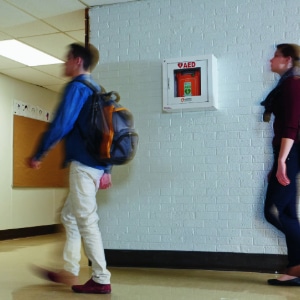THE THINGS WE BUY, WE HOPE THAT WE WILL NEVER USE
On average, businesses spend around £1000 every year, on servicing and maintaining their fire safety systems and equipment. With additional costs for alarm systems and fire extinguishers, in the thousands of pounds (one company recently spent £38,000). There are on average 16,000 business related fires each year, and sadly around 200 fire related deaths each year (England 2017), so the need for such an investment is apparent.
It is a requirement of health and safety legislation, that all businesses install and maintain such systems and equipment. But could more lives be saved?
Over 33,000 people suffering from sudden cardiac arrest, outside of the hospital environment each year, with around a 90% mortality rate. With no legal requirement for businesses to have defibrillators, we feel that it is time to ensure that everywhere that there is a fire extinguisher, there is also a defibrillator.
For the same price as the average annual servicing costs for fire safety equipment, a business could have a defibrillator, which would be guaranteed for eight years, have no on-going service requirements, and have the potential to save more lives.
With a little further investment, thought and planning, these defibrillators could be made accessible to members of the public, utilised as a shared resource by neighbouring businesses, and help to make the communities in which we live and work, safer places to be.
Many communities are now having AED installed, in old telephone boxes, outside their village hall, pub, shop or school. The sooner a patient who is in cardiac arrest can be shocked, the greater the chance of a return to a normal life.
So, we are looking for businesses to work together, to make their premises and communities a safer place to work and live.
Imagine.
If 10 businesses, contributed £200 each
- It would provide a piece of life saving equipment
- Which requires no servicing
- Which is guaranteed for eight years
- Which would be registered with the local ambulance service, who can direct people to where it is and how to use it in a life threatening situation
- Which can be utilised as a resource to themselves and their local community
- Would provide training for 24 people, an awareness session for the local community, and a days training for children in a primary or junior school
STATISTICS
- Over 50% of people who suffer from sudden cardiac arrest, have no previous cardiac history
- Approximately 70% of out-of-hospital cardiac arrests happen in homes.
- Approximately 12 young people lose their lives every week in the UK form sudden cardiac arrest
- Approximately 270 of those young people suffer cardiac arrest whilst they are at school
- Approximately 46% of people who experience an out-of-hospital cardiac arrest get the immediate help that they need before professional help arrives.
If you would like some first aid training in relation to these and other conditions, please do not hesitate to contact Passion First Aid on 07811 025169, email enquiries@passionfirstaid.co.uk, or go to our website, www.passionfirstaid.co.uk

